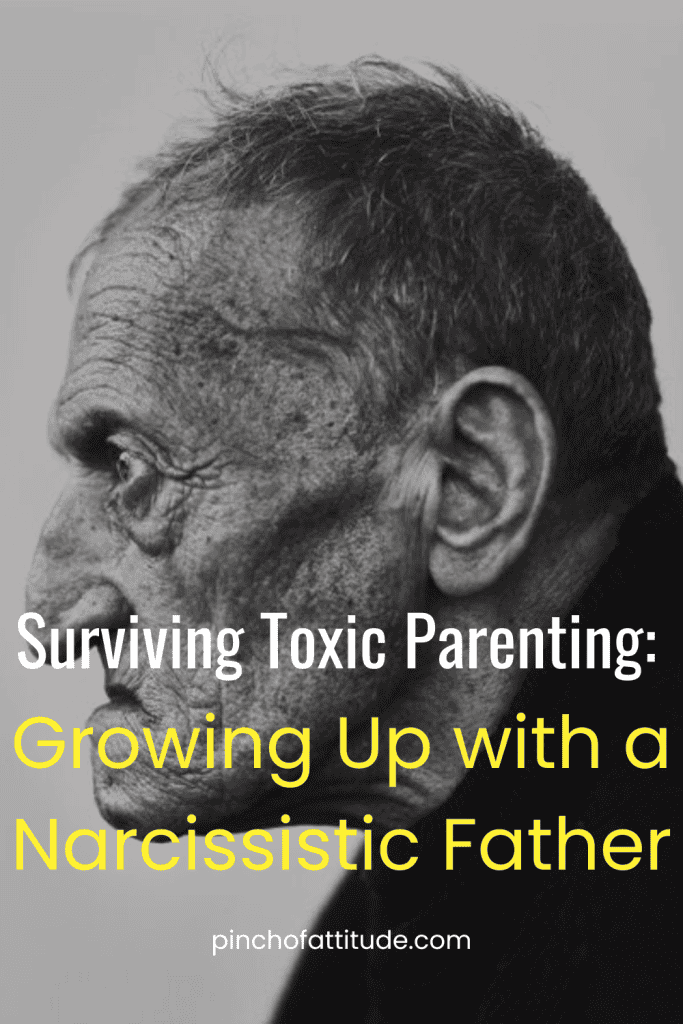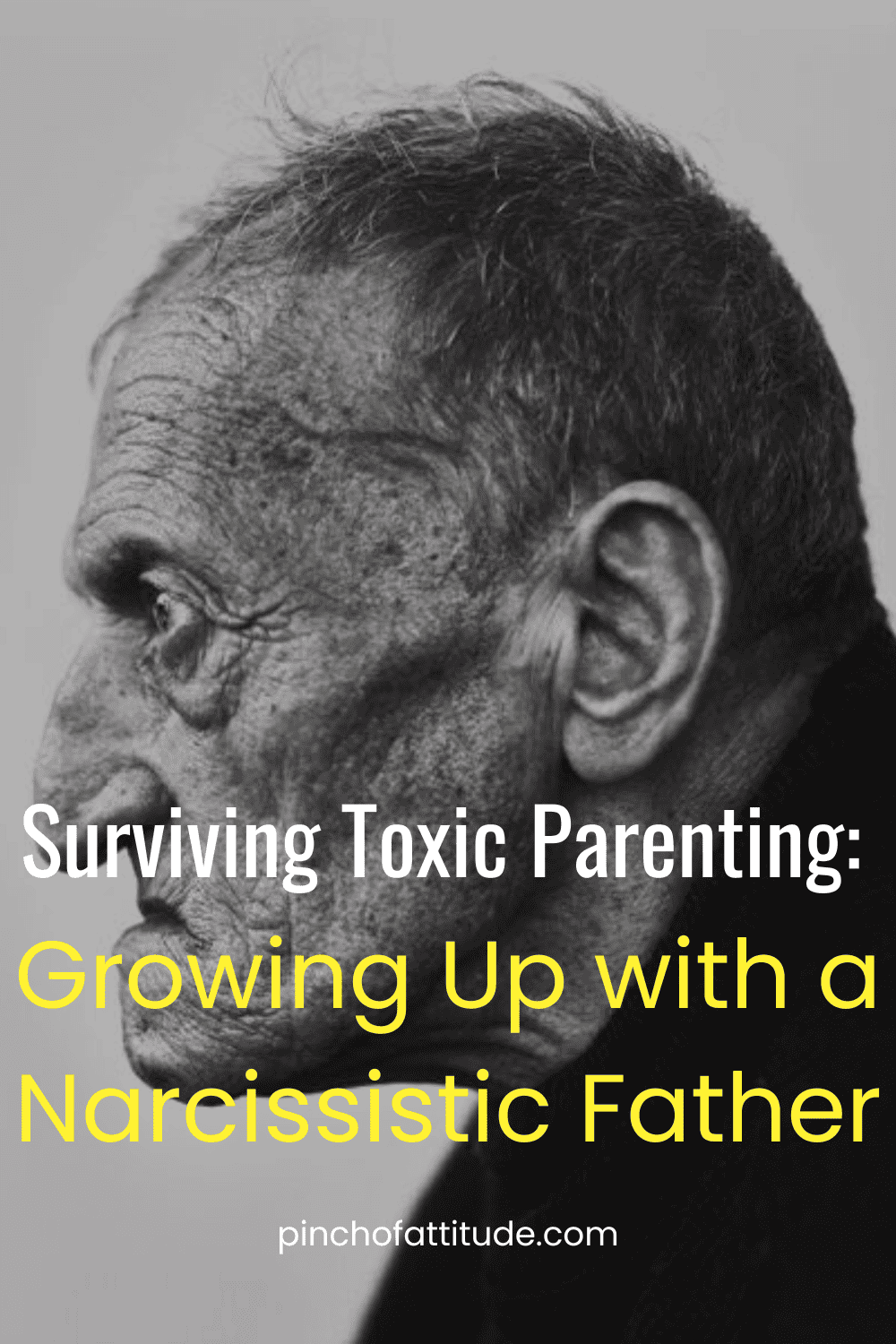Family bonds. Shared blood. A supposed guarantee of love and support.
Yet, for my cousins, in these very ties lie a twisted truth they know intimately: the cost of growing up with a narcissistic father.
My uncle, not unlike his sister (my own mother), cast a long shadow of self-absorption over his children’s lives, leaving emotional wreckage in his wake.
Are you also wondering about the effects of being raised by a narcissist and whether you’re in the same boat?
If so, let me share with you our story. This isn’t just a tale of parental neglect. It’s a reflection of the insidious ripple effect of narcissism.
- Children of narcissistic fathers may struggle with trust, low self-esteem, seek external validation, experience difficulty setting boundaries, and face challenges in forming healthy relationships.
- Don’t let it define you. Kids of narcissistic dads often become masters of resilience, building independence, and forging their own paths.
- By seeking professional help and building self-awareness, you can recognize narcissistic traits, and understand their impact. You’re not stuck. You can break free from the cycle of abuse.
Table of Contents
What Is It Like Growing Up With a Narcissistic Father?

Imagine a childhood where love is a performance, praise is a fleeting crumb, and family is a stage for your narcissistic father’s grand act.
This, sadly, is the reality for many children of narcissistic parents, a reality my own cousins know intimately.
Their narcissistic dad wasn’t just physically missing, he was emotionally distant, a black hole of self-absorption who sucked the joy from their home.
His other family, the one he left his then-pregnant wife for, became a constant reminder of the love and support he chose to withhold from his own.
Even then, I already saw the signs of narcissistic parenting everywhere.
And then, as my cousins found their footing, and built lives fuelled by their mother’s resilience, another layer of cruelty unfolded.
When they finally achieved financial success, he emerged, not as a supportive father, but as a leech, demanding a share of their hard-earned triumphs.
This parasitic behavior, a mirror image of my own mother’s narcissistic tendencies, only solidified the truth: the apple truly doesn’t fall far from the tree.
Tip
Healing involves understanding, not blaming. Learn about narcissistic traits and recognize their impact. This can empower you to break free from the cycle of abuse.
Long-Term Effects of Growing Up With a Narcissistic Father?
The effects of narcissistic parenting can be far-reaching and deeply impact individuals well into adulthood.
Adult children raised by narcissistic fathers often struggle with low self-esteem, difficulty forming healthy relationships, and emotional issues like anxiety and depression.
They may also develop codependent tendencies and struggle to set boundaries due to the unpredictable and manipulative behavior they witness.
Here’s a closer look at some of the long-term impacts:
- Family relationships: Adult children of narcissists often have strained or nonexistent relationships with their parents. They may also experience difficulty forming healthy bonds with other family members.
- Emotional issues: Growing up with a father with narcissistic tendencies can result in an increased risk of developing anxiety, depression, and post-traumatic stress disorder (PTSD). There’s also the risk of substance abuse and self-harm.
- Codependency: A narcissistic parent’s children learn to rely on others for their sense of self and well-being. They may also struggle to set boundaries and allow others to take advantage of them.
- Identity issues: Children who grow up with a narcissist may have difficulty developing a strong sense of self. They may constantly seek approval from others and struggle to define their own values and goals.
It’s important to remember that everyone’s experiences and how they react to them are different. Some may also be more resilient than others.
However, if you recognize any of these signs in yourself, seek professional help. Therapy can help you heal and develop healthy coping mechanisms.
Common Traits If You Grew Up With a Narcissistic Father
Speaking as a child of a narcissist myself, I know for a fact that my childhood experiences lingered long after I’ve grown.
They shaped my relationships, sense of self, and my perception of the world.
But from all the narcissistic manipulation and gaslighting we were exposed to, how can one really tell if they grew up with a narcissistic parent?
Looking at my cousins’ lives and the stories of countless adult children of narcissistic parents, here are the most common signs:
1. You May Struggle With Trusting Others
The manipulative behavior of a narcissistic father can make children become doubtful of others’ intentions and develop a cynical view of the world.
Every kind word, every gesture of support, might feel laced with hidden agendas, leaving you constantly scanning for the next betrayal.
They become hypersensitive to subtle shifts in tone or expression, constantly questioning the sincerity behind smiles and promises.
This constant vigilance can wear down their ability to simply accept kindness at face value and may develop full-blown trust issues in adulthood.
Tip
Start small. Test the waters of trust in low-risk situations. Each positive experience, no matter how small, can be a step towards rebuilding trust in others.
2. Your Self-Esteem Might Be Low
A narcissistic dad often belittles and criticizes his children, which can lead to low self-esteem and low self-worth.
These wounds can manifest in a constant struggle to feel truly seen and appreciated, even in moments of success.
You might find yourself comparing yourself relentlessly to others.
Or worse, you might resort to chasing after grandiose fantasies of success, desperately hoping to prove your worth.
3. You Often Seek Validation From Others
Another common impact of growing up with a narc father is that children develop a need for external validation.
Narcissistic people often dominate the household and place themselves at the center of attention, emotionally neglecting those around them, including their children.
As such, they learn to seek validation from others as a kind of coping mechanism.

4. Setting and Maintaining Healthy Boundaries Can Be Hard for You
Saying “no” feels like defusing a bomb for kids of narcissistic dads. Boundaries? More like minefields.
Growing up with a master manipulator, you learn to predict the emotional fallout that can happen before uttering even a single sound.
So, you tiptoe, avoid conflict, and let others take the reins. After all, it’s easier than the inevitable explosion.
But guess what? You deserve a safe space, a corner of the world where you matter.
Reclaiming your voice, setting limits, and saying “enough” is tough, but it’s the key to building a life where boundaries don’t feel like battlegrounds.
5. You Might Fear Abandonment or Rejection
Ever feel like walking on eggshells around emotional earthquakes? If you grew up with a narcissistic dad, that’s your childhood in a nutshell.
One minute, sunshine and rainbows, the next, a storm cloud over their head.
An upbringing this unpredictable can leave anyone constantly scanning for signs of trouble, bracing for the fallout.
No wonder a child of a narcissistic parent would fear abandonment like a lost puppy.
Rejection hits differently when Dad’s love feels less like a warm hug and more like a flickering light switch.
6. You Tend to Please People, Often at Your Own Expense
For kids of narcissistic parents, people-pleasing isn’t a hobby, it’s a survival skill.
Every smile, every yes, a desperate bid to please their parents and avoid the emotional black hole that follows disapproval.
This “martyr mindset” sticks, making you bend over backward for others, even when it means neglecting your own needs.
But remember, your needs matter, your desires aren’t burdens.
Learn to prioritize yourself and discover the joy of pursuing your own desires. That’s the real magic trick.
7. Expressing Your Emotions Could Be Challenging
Know that feeling of having a knot in your throat, your emotions stuck like traffic on a bad day?
Children raised by narcissists often find expressing emotions challenging, and it’s not surprising.
Growing up, the narcissistic parent rarely acknowledges or validates their needs and desires, so what’s the point?
They learn to suppress their own feelings to avoid conflict or rejection.

8. You’re More Susceptible to Anxiety and Depression
The unpredictable shifts in mood, the lack of empathy, and the constant pressure to perform can leave you with a shaky foundation.
Every shadow holds a potential threat, every silence a brewing storm.
No wonder, then, that anxiety and depression often become unwelcome guests in the lives of children raised by narcissistic individuals or people with NPD.
Over time, the childhood trauma of living in a volatile environment takes its toll. You then become hypervigilant, scan for threats, and brace for the next emotional storm.
But you’re not trapped in this emotional rubble.
With self-compassion, support, and tools to manage difficult emotions, you can rebuild your inner resilience, brick by brick.
You can learn to weather the storms within, not just brace for them.
9. Forming and Maintaining Healthy Relationships Can Be Tough
Did you watch your dad waltz through relationships like a butterfly changing flowers? Yeah, for kids of narcissistic parents, healthy bonds can feel like a foreign language.
Growing up with someone who belittled others, dismissed boundaries, and made emotional manipulation an Olympic sport, can make you question what “normal” even looks like.
You struggle with asserting boundaries, trusting others, and expressing your true self, ultimately impacting your ability to form healthy relationships.
But real connection is out there, only if you learn to set boundaries, communicate your needs, and trust your intuition.
Love doesn’t require masks or mind games, it thrives on authenticity and respect.
So take a deep breath and open your heart. You deserve relationships that make you feel safe, seen, and truly cherished.
10. You Might Lean Towards Perfectionism or Self-Criticism

Ever feel like your inner critic is a drill sergeant on a sugar rush?
Growing up with a narcissistic parent often means inheriting a tendency to hold yourself to impossible standards.
Every mistake feels like a spotlight on your flaws, every achievement a hollow echo of their expectations.
Perfectionism becomes your armor, self-criticism your constant companion.
But the truth is, you’re not just an extension of the narcissistic parent’s ego. You’re a unique masterpiece.
Learning to loosen the grip of self-criticism, embrace imperfections, and show yourself some much-deserved self-compassion – that’s the real power move.
11. You Could Develop Some Narcissistic Traits Yourself
Ever feel the echo of your dad’s spotlight bouncing off your own ego? I noticed that it’s a thing, this “narcissistic echo.”
See, growing up with a father who worshipped his own reflection can sometimes make you, well, want a piece of that spotlight too.
In a twisted defense mechanism, children can internalize some of those traits.
You might find yourself seeking admiration, struggling to accept criticism, or prioritizing your own needs above others.
It’s not malice, it’s mimicry.

12. Dealing With Authority Figures Might Be Difficult for You
Do you remember feeling like walking on eggshells around your dad, the unpredictable boss of your childhood?
That can leave a lasting mark on how you interact with authority figures.
Bosses, teachers, even cops – any hint of power can trigger that familiar knot of anxiety, making you either rebel against it or bend over backward to please.
Any hint of criticism triggers that old fight-or-flight reflex. And it can make it hard to learn that you deserve respect, no matter who’s wearing the badge.
13. You Often Feel Guilty for Others’ Emotions
Did your dad’s unpredictable moods make you feel like the sun revolved around him? That emotional baggage can stick.
You might find yourself carrying the weight of others’ feelings like a sponge absorbing every drop of guilt and responsibility.
Their anger? Your fault. Their sadness? You must have done something wrong.
This “emotional sponge” tendency is a twisted echo of your dad’s need for admiration, a subconscious belief that happiness depends on your ability to please.
But you’re not a therapist, you were a child.
Learning to set healthy boundaries, detach from emotional manipulation, and prioritize your own well-being – that’s the real strength.
Remember, your emotional energy isn’t a bottomless well. Choose to fill it with things that nourish you, not drain you.
14. Making Decisions and Trusting Your Judgment Can Be Hard
A narcissistic family member’s overpowering influence instills self-doubt and a lack of confidence in individual decision-making.
That nagging self-doubt, the constant second-guessing. It’s like your brain has a built-in “approval filter” that throws shade on every choice.
It can take years of self-awareness and therapy to learn to trust your inner compass again, a voice that knows what’s right for you.
Remember, stumbles are stepping stones, not failures. Enjoy the journey of charting your own course, one confident step at a time.
15. You’ve Likely Developed a Strong Sense of Resilience and Independence
Despite the challenges of being raised by a narcissistic parent, individuals often develop a remarkable sense of resilience and independence.
You learn to adapt, to think on your feet, to find your own way when the map is shredded confetti.
You become resourceful, independent, and resilient like a dandelion pushing through cracks in the sidewalk.
This grit, this self-reliance – it’s your superpower, forged in the fires of a childhood that wasn’t all sunshine and rainbows. So, own it.
Celebrate your resourcefulness, and your ability to stand tall on your own two feet.

Best Way to Recover From Your Narcissistic Father
The best way to survive a narcissistic father is to prioritize self-care, seek professional therapy, and establish healthy boundaries.
That said, it’s also important to note that recovering from narcissistic abuse is a journey, not a destination. There’s no one-size-fits-all solution.
Narcissists often leave emotional scars, and you’ll need time, understanding, and the right support to heal and build healthy relationships.
Picture this: you cut ties with the dad who treated you like a prop in his drama, and instead of feeling lost, you find freedom.
That’s what it looked like for my cousins.
They put their dad on mute, both physically and emotionally, and pumped up the volume on their own well-being.
Their mom, a woman of strength, was their anchor.
She helped them build resilience, reminding them that they were worthy of love and support, even if their dad couldn’t offer it.
Professional family therapy further aided in addressing the deep-rooted scars of the parent-child relationship.
It provided a safe space for healing and breaking the cycle of narcissistic personality disorder within the family dynamic.
Their journey wasn’t a sprint, it was a climb, and they did it together, one step at a time.
Related Posts:
- 30 Things Narcissistic Fathers Say: How to Verbally Disarm Them
- 17 Narcissistic Father Abuse Tactics and Its Ugly Effects on You
- 13 Narcissist Father Traits You Don’t Expect to See
- How to Deal With a Narcissistic Father? It’s Not About Him!
- How to Defeat a Narcissist Father: 9 Psychological Tips You Can Use Today
Frequently Asked Questions
What happens when you grow up with a narcissistic father?
Children raised by someone with narcissistic traits may endure emotional neglect, seek constant approval, battle low self-esteem, and struggle to form healthy relationships.
How do you overcome trauma from a narcissistic father?
Overcoming the trauma of a narcissistic father involves therapy, setting boundaries, self-compassion, and building a supportive network.
Do narcissistic fathers suffer from low self-esteem?
Paradoxically, a narcissistic father may mask low self-esteem with grandiosity and seek constant validation to fill an internal void.
What kind of children do narcissists raise?
A narcissistic parent may raise children prone to self-doubt, anxiety, and low self-esteem. Some children may become people-pleasers or develop narcissistic traits themselves, while others become resilient.
How do narcissistic men treat their children?
A narcissistic father may emotionally neglect, demand constant validation, and use children as extensions of their own needs. This can impact their well-being well into adulthood.




